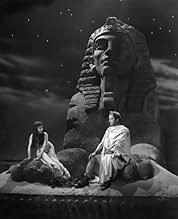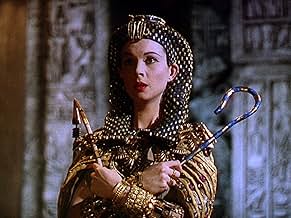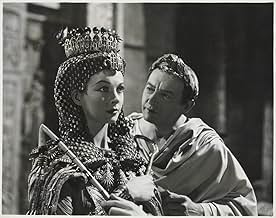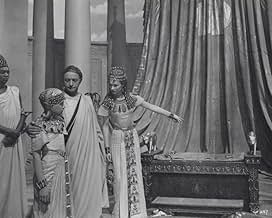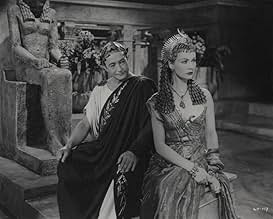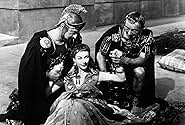AVALIAÇÃO DA IMDb
6,2/10
3,3 mil
SUA AVALIAÇÃO
No auge da Guerra Civil Romana, a jovem Cleópatra conhece o Júlio César, que a ensina como governar o Egito.No auge da Guerra Civil Romana, a jovem Cleópatra conhece o Júlio César, que a ensina como governar o Egito.No auge da Guerra Civil Romana, a jovem Cleópatra conhece o Júlio César, que a ensina como governar o Egito.
- Indicado a 1 Oscar
- 2 indicações no total
Anthony Eustrel
- Achillas
- (as Antony Eustrel)
James McKechnie
- 2nd. Centurion
- (as James Mc Kechnie)
Avaliações em destaque
Shaw's hardly a speck on the windshield of American cultural consciousness anymore. Too bad. "The Devil's Disciple," "Major Barbara," "Arms and the Man," "Candida," "You Never Can Tell." Witty, clever, insightful, intriguing... a century and more later.
For those who haven't discovered him yet, this colorful, fast-paced rendition of "C&C" makes a nifty portal. The film -looks- like "Quo Vadis" or "Samson and Delilah" (of more or less the same vintage). It even looks like the Taylor-Burton-Harrison marathon done almost two decades later.
But it doesn't -feel- like -any- of those. Shaw always had a great story to tell -- and a something worthwhile to -say- -- and he (or his characters) almost invariably told and said it well. One could hardly call the 1934 or 1963 films "insightful romps." This, however...
I've been a sucker for Vivien Leigh since I watched her whip the boys into shape in "GWTW," but as interesting as she was there, she's miles beyond Scarlet O'Hara here. Shaw gave -his- Cleo a far more complex character than Young or Mankiewicz gave their Cleo's; this alabaster Leigh is both adolescent and guileful. But to Rains's conflicted but self-suspect Caesar, she's about as transparent as that look-alike, late-night, hottie-cum-biblical-scholar who inherited Gene Scott's TV ministry.
The relationships here are no different from those in the Mankiewicz mess, but they move along in far more sophisticated -- and entertaining -- fashion here. We already know the resolution, it's the unfolding of the drama that matters.
Rains ("Casablanca," "The Invisible Man") and Leigh bring the wise, amused, self-effacing old man and the desperate, manipulative, narcissistic young woman in Shaw's play far more credibly to life than was the case in the DeMille or Manciewicz films. And supporters like Robson, Granger and the rest add plenty. But as in any Shaw play, it's the playwright's sophisticated revelations that matter.
The "big success" narcissist who thinks a "trophy wife" is a good idea might learn plenty from a trip to Blockbuster and a two-dollar investment.
For those who haven't discovered him yet, this colorful, fast-paced rendition of "C&C" makes a nifty portal. The film -looks- like "Quo Vadis" or "Samson and Delilah" (of more or less the same vintage). It even looks like the Taylor-Burton-Harrison marathon done almost two decades later.
But it doesn't -feel- like -any- of those. Shaw always had a great story to tell -- and a something worthwhile to -say- -- and he (or his characters) almost invariably told and said it well. One could hardly call the 1934 or 1963 films "insightful romps." This, however...
I've been a sucker for Vivien Leigh since I watched her whip the boys into shape in "GWTW," but as interesting as she was there, she's miles beyond Scarlet O'Hara here. Shaw gave -his- Cleo a far more complex character than Young or Mankiewicz gave their Cleo's; this alabaster Leigh is both adolescent and guileful. But to Rains's conflicted but self-suspect Caesar, she's about as transparent as that look-alike, late-night, hottie-cum-biblical-scholar who inherited Gene Scott's TV ministry.
The relationships here are no different from those in the Mankiewicz mess, but they move along in far more sophisticated -- and entertaining -- fashion here. We already know the resolution, it's the unfolding of the drama that matters.
Rains ("Casablanca," "The Invisible Man") and Leigh bring the wise, amused, self-effacing old man and the desperate, manipulative, narcissistic young woman in Shaw's play far more credibly to life than was the case in the DeMille or Manciewicz films. And supporters like Robson, Granger and the rest add plenty. But as in any Shaw play, it's the playwright's sophisticated revelations that matter.
The "big success" narcissist who thinks a "trophy wife" is a good idea might learn plenty from a trip to Blockbuster and a two-dollar investment.
Enjoyed seeing this great film classic from the Year 1945 with a fantastic cast of great veteran actors and stars who were just starting their careers. Claude Rains played the role as Julius Caesar who in this film was a wise old fox who is very forgiving for many reasons and stumbles upon Cleopatra, (Viven Leigh) in the desert and she does not know that he is Julius Caesar. Caesar charms Cleopatra and they become good friends, and Caesar teaches her how to rule her country of Egypt and tries to solve her problems with her servants and mostly her brother who wants to be king and ruler. There is plenty of comedy in this film which surprised me, because I had no idea it is really a film loaded with funny scenes and excellent acting by the entire cast. Stewart Granger gave a great supporting role along with Michael Rennie. If you look close you will see Jean Simmons playing as a harpist who later on in real life married Stewart Granger. Lots of fun to view this film from the past. Enjoy
Bernard Shaw does not perhaps adapt too well to the screen, but, in my opinion, this adaptation is particularly successful and probably the best of them all, although one video edition in the UK didn't even risk mentioning Shaw's name anywhere on the box, prefering to market it as mere exotic spectacle. It is of course all that, but as with everything Shaw wrote, much, much more, and is essentially about IDEAS, (not necessarily, as has often been contended, always Shaw's own personal convictions). Vivien Leigh as Cleopatra gives yet another sublime and first-rate performance as she progresses from frightened teenager to an imperious Queen with a real understanding of power. (The scene in which she whips a hapless slave in order to experience the "thrill" of total power, strangely pre-echoes the psychology of the much misunderstood SALO). Mention too must also be made of the superb musical score by Georges Auric, and admiration expressed for the sheer audacity of producer Pascal for making such a lavish and expensive production in poverty-stricken post-war Britain. Well worth watching.
British Technicolor adaptation of George Bernard Shaw's historical play, from Eagle-Lion and director Gabriel Pascal. Roman conqueror Julius Caesar (Claude Rains) arrives in Alexandria, Egypt to supervise the occupation of the newly-acquired territory. He meets young queen Cleopatra (Vivien Leigh), a submissive girl without the skill or training to wield power. Caesar decides to personally tutor her in the ways of ruling others, while also fending off various uprisings.
This was the most expensive British film ever made at the time, and it looks it, with large, impressive sets, dozens of extras, colorful costumes, and elaborate set-pieces. The film was scripted by Shaw, and it retains the "Shakespeare-lite" quality to the dialogue. It may take modern ears a bit to get used to, but it's more accessible than the Bard's densest prose. I thought Rains was very good as older, wiser and often bemused Caesar. Stewart Granger is youthful and heroic, and Flora Robson is a scene-stealer as a powerhouse of a nurse to Cleopatra. The weakest link is Vivien Leigh, who I never bought into here. I read after watching that she suffered a miscarriage and a mental breakdown while filming, so that explains a lot of the uneven nature of her screen work. Director Pascal does a poor job of opening up the play, despite his big budget. There are a scattered few cinematic shots, but most of it feels liked a filmed stage performance. The movie earned an Oscar nomination for Best Color Art Direction.
This was the most expensive British film ever made at the time, and it looks it, with large, impressive sets, dozens of extras, colorful costumes, and elaborate set-pieces. The film was scripted by Shaw, and it retains the "Shakespeare-lite" quality to the dialogue. It may take modern ears a bit to get used to, but it's more accessible than the Bard's densest prose. I thought Rains was very good as older, wiser and often bemused Caesar. Stewart Granger is youthful and heroic, and Flora Robson is a scene-stealer as a powerhouse of a nurse to Cleopatra. The weakest link is Vivien Leigh, who I never bought into here. I read after watching that she suffered a miscarriage and a mental breakdown while filming, so that explains a lot of the uneven nature of her screen work. Director Pascal does a poor job of opening up the play, despite his big budget. There are a scattered few cinematic shots, but most of it feels liked a filmed stage performance. The movie earned an Oscar nomination for Best Color Art Direction.
Impressive acting is the highlight of 1945's "Caesar and Cleopatra," a British production starring Vivien Leigh, Claude Rains, Stewart Granger, Flora Robson and Francis L. Sullivan. In smaller roles, you can spot Michael Rennie, Kay Kendall and Jean Simmons.
This production was not without its problems - made during World War II, bombings often delayed the filming; there was a five-week break while Vivien Leigh recovered from a miscarriage; and there was a shortage of materials to build the sets. Nevertheless, for a British film, this is a real spectacle and made in color, which was also unusual back then.
Shaw's Cleopatra (Leigh) is a childlike girl/woman who has hitting matches with her younger brother, runs, giggles, talks fast and becomes nervous at the thought of meeting the great Caesar (Rains). In the beginning, she meets him without realizing it. The two have a flirtation while he teaches her how to be a queen. Shaw's Caesar is an old man, a great warrior and a benevolent ruler who rules with a velvet glove rather than a sword.
Rains and Leigh are wonderful in their roles. Rains, as someone stated, with his Caesar haircut, weary face and beautiful profile looks as if he stepped out of that time period. His mastery of Shaw's language is magnificent, and he really holds the film together.
The stunningly beautiful Leigh, white-faced with glorious cheekbones and dazzling eyes, is a whimsical Cleopatra at first. She matures and becomes calmer and more regal as she learns how to be a queen, but she falls back into her childish ways in the presence of Caesar, particularly when he promises to send her Marc Anthony.
They say the camera adds 10 pounds - frankly, I'm surprised any of the actors could see Leigh, she is so tiny. She gives a sprightly, energetic performance. Shaw's Cleopatra is 16 (though in reality she is 20 or 21) - Leigh was 32 at the time of filming and comes off like the teenager Shaw wrote.
Stewart Granger as Apollodorus shows off his very hunky physique - no wonder he came to the attention of Hollywood. As two aides of Caesar's, Basil Sydney as Ruffio and Cecil Parker as Britanus give fine performances. Finally, Flora Robson as the protective, tough nursemaid of Cleopatra's, Ftatateeta, sinks her teeth into the role and is a force to contend with.
This movie flopped, probably because audiences thought it was going to be some huge spectacle - it's big for England, but it's not DeMille. Still, it's a real treat to see one of the classics done by two great actors who were well-trained and well-equipped to perform George Bernard Shaw.
This production was not without its problems - made during World War II, bombings often delayed the filming; there was a five-week break while Vivien Leigh recovered from a miscarriage; and there was a shortage of materials to build the sets. Nevertheless, for a British film, this is a real spectacle and made in color, which was also unusual back then.
Shaw's Cleopatra (Leigh) is a childlike girl/woman who has hitting matches with her younger brother, runs, giggles, talks fast and becomes nervous at the thought of meeting the great Caesar (Rains). In the beginning, she meets him without realizing it. The two have a flirtation while he teaches her how to be a queen. Shaw's Caesar is an old man, a great warrior and a benevolent ruler who rules with a velvet glove rather than a sword.
Rains and Leigh are wonderful in their roles. Rains, as someone stated, with his Caesar haircut, weary face and beautiful profile looks as if he stepped out of that time period. His mastery of Shaw's language is magnificent, and he really holds the film together.
The stunningly beautiful Leigh, white-faced with glorious cheekbones and dazzling eyes, is a whimsical Cleopatra at first. She matures and becomes calmer and more regal as she learns how to be a queen, but she falls back into her childish ways in the presence of Caesar, particularly when he promises to send her Marc Anthony.
They say the camera adds 10 pounds - frankly, I'm surprised any of the actors could see Leigh, she is so tiny. She gives a sprightly, energetic performance. Shaw's Cleopatra is 16 (though in reality she is 20 or 21) - Leigh was 32 at the time of filming and comes off like the teenager Shaw wrote.
Stewart Granger as Apollodorus shows off his very hunky physique - no wonder he came to the attention of Hollywood. As two aides of Caesar's, Basil Sydney as Ruffio and Cecil Parker as Britanus give fine performances. Finally, Flora Robson as the protective, tough nursemaid of Cleopatra's, Ftatateeta, sinks her teeth into the role and is a force to contend with.
This movie flopped, probably because audiences thought it was going to be some huge spectacle - it's big for England, but it's not DeMille. Still, it's a real treat to see one of the classics done by two great actors who were well-trained and well-equipped to perform George Bernard Shaw.
Você sabia?
- CuriosidadesThe role of Caesar originally was offered to Sir John Gielgud, who turned it down because he detested Director Gabriel Pascal.
- Erros de gravaçãoCaesar refers to his nose as "rather long" and "a Roman nose," but the idea of a "Roman nose" was not introduced until almost 150 years later, when the Emperor Hadrian erected statues of his favorite, Antinous, throughout the Empire (where many of the people had never seen a Roman), and Antinous's long nose was taken as typical of Romans (even though Antinous was a Greek).
- Citações
Julius Caesar: And so to the end of history, murder shall breed murder, always in the name of right, and justice, and peace, until the gods create a race of men that can understand.
- Cenas durante ou pós-créditosClosing credits cast list finishes with And The Crowd.
- ConexõesFeatured in Great Performances: Laurence Olivier: A Life (1983)
Principais escolhas
Faça login para avaliar e ver a lista de recomendações personalizadas
- How long is Caesar and Cleopatra?Fornecido pela Alexa
Detalhes
- Data de lançamento
- País de origem
- Idioma
- Também conhecido como
- César y Cleopatra
- Locações de filme
- Empresas de produção
- Consulte mais créditos da empresa na IMDbPro
Bilheteria
- Orçamento
- £ 1.278.000 (estimativa)
- Tempo de duração2 horas 18 minutos
- Proporção
- 1.37 : 1
Contribua para esta página
Sugerir uma alteração ou adicionar conteúdo ausente



